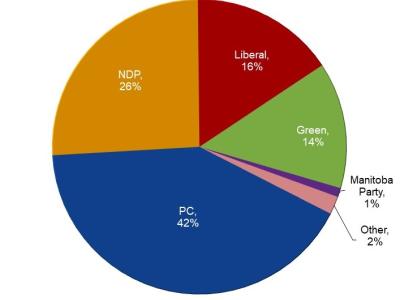Manitoba’s New Democrats end 2024 on a high note. They continue to hold a significant advantage in popular support despite slipping slightly during the past three months.
Today, more than one-half of Manitobans (53%) indicate they would cast a ballot for Wab Kinew and the Manitoba New Democratic Party (NDP). Although this is down slightly (-3%) from their mark in September, it remains well-ahead of the 45 per cent vote share the party achieved in the last provincial election.
Meanwhile, Progressive Conservative (PC) support remains unchanged at 34 per cent, with the Manitoba Liberals rebounding slightly to six per cent (+2% vs. September). Six per cent of Manitobans would cast ballots for other parties not represented in the Legislature, while 18 per cent of those surveyed are undecided.
The NDP’s lead within Winnipeg, where it currently holds all but two seats in the Legislature, remains extremely strong, with six in 10 preferring this party (61%, unchanged from September). PC support decreased slightly (27%, -2%), with support for the Liberals increasing marginally (+1%). Outside Winnipeg, NDP support has decreased (from 48% in September to 43% today), with the PCs statistically tied with the NDP in this region (44%, +1%).
The NDP maintains a strong lead among female voters, with the NDP and PCs statistically tied among men. The NDP lead continues to be higher among most demographic groups, with racialized voters and those with higher levels of formal education more likely to back the party.
Two-thirds of Manitoba voters continue to approve of NDP Premier Wab Kinew’s job performance, with one-third approving of interim PC leader Wayne Ewasko’s work. One-quarter approve of interim Liberal leader Cindy Lamoureux, down slightly from the mark she achieved in September (24%, -6%).
A majority of Manitobans continue to hold a positive view of the NDP government. Although outright enthusiasm for the government has decreased slightly during the past three months, one-third indicate they are satisfied and one in 10 express happiness about the government’s performance at this point. Three in 10 are now indifferent – up from one in five in September. Fewer than one in five use terms like disappointed, upset or angry to describe their feelings about the NDP administration.
The Story
Wab Kinew and the NDP close the year in an enviable position for a new government. Although enthusiasm for the government has cooled slightly, the party and the premier remain highly popular in all areas of Manitoba, including the PC’s rural strongholds.
The NDP enters what promises to be a year of significant transition – with a new U.S. president and potentially a new federal government – in a strong, stable position politically at home. While things could shift once the PCs elect a new permanent leader in 2025, the party’s high support and the premier’s personal level of popularity leaves it in a secure spot for weathering these challenges.
Disclosure Statement
Probe Research is a member of the Canadian Research Insights Council (CRIC) and confirms that this research fully complies with all CRIC Standards including the CRIC Public Opinion Research Standards and Disclosure Requirements. Learn more at: https://www.canadianresearchinsightscouncil.ca/standards/por/
Methodology
Probe Research surveyed a random and representative sampling of 1,000 adults residing in Manitoba between November 26 and December 10, 2024.
With a sample of 1,000, one can say with 95 per cent certainty that the results are within ± 3.1 percentage points of what they would have been if the entire adult population of Manitoba had been surveyed. The margin of error is higher within each of the survey’s population sub-groups.
The sample consists of 483 Manitobans randomly recruited via live-agent operator; 311 randomly recruited via Interactive Voice Response (IVR) and 206 members of Probe Research's online panel. All respondents completed the survey on an online platform.
Modified random digit dialing, including both landline and wireless numbers, ensured all Manitoba adults had an equal opportunity to participate in this Probe Research survey.
Minor statistical weighting has been applied by age, gender and regional and educational attainment so that the sample properly reflects the province’s population, based on Census data.




